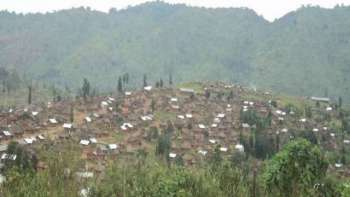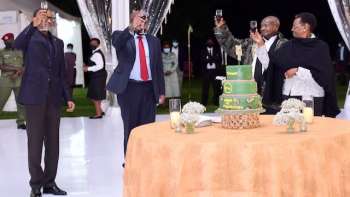Former Zambian President and independence fighter and leader, Kenneth Kaunda, died on Thursday June 17, 2021. He was 97 years old. Kenneth Kaunda was Zambia's first president, following Zambia independence from Britain, in 1964. He was considered as one of African freedom fighters and heroes for the fight against colonialism and later, Apartheid. He ruled from 1964 until 1991.
His death, from undisclosed illness, was confirmed by Zambia's current President Edgar Chagwa Lungu. In an official statement, President Edgar Changwa Lundu said: "I learnt of your passing this afternoon with great sadness. On behalf of the entire nation and on my own behalf I pray that the entire Kaunda family is comforted as we mourn our First President and true African icon".
Freedom Fighter, Dictator, and One of the First African Presidents to Peacefully Transition to Democratic Rule.
Kenneth Kaunda freedom fighting encouraged many leaders in Africa to launch movements to liberate their countries from colonialism, racial segregation, apartheid, and repression
Kenneth Kaunda's rule started very well, but led to disappointment when he decided to become a dictator. In fact, following Zambia's independence in 1964, Kaunda ruled and rejected democratic changes in his country for 27 years, keeping his country under a one-party system and one-man rule .
Advertisement
on Amazon and bARNES NOble-- click here
For more on Legs of Tornado: The Human Who Outran the Wind, Visit the site Legs of Of Tornado, here
His inability to address economic challenges, his hold on authoritarian rule, and the increasing internal and international pressures to bring more democracy to Africa led to his demise. He was further weakened when his close friend Julius Nyerere released power and retired as president of Tanzania in 1985 and started encouraging Kenneth Kaunda to do the same.
Following a coup attempt by military officers to protest against his desire to maintain the monopoly of his ruling party UNIP, Kenneth Kaunda finally accepted democratic changes and elections. Kenneth Kaunda lost elections and was defeated with only 24 percent of the votes 75 percent for the Movement for Multiparty Democracy (MMD), led by trade union leader Frederick Chiluba.
Kenneth Kaunda handed power to Chiluba on 2 November 1991, becoming the second mainland African head of state, to allow free multiparty elections and to peacefully relinquish power when he lost. Mathieu Kérékou of Benin, had been the first when he released power in March 1991.
Despite disappointments with Kenneth Kaunda's one party-rule and dictatorship during his rule, many Africans have admired his bravery in peacefully transitionning to democracy. They have called current African dictators to follow his example. Some of the dictators often mentioned include: Yoweri Museveni of Uganda, Sassou Nguesso of Republic of Congo, Paul Kagame of Rwanda, Paul Biya of Cameroon, Faure Essozimna Gnassingbé Eyadéma of Togo, Ali Bongo Ondimba of Gabon, Teodoro Obiang Nguema Mbasogo of Equatorial Guinea (see African Dictators, Sons, and Daughters: Chad Dictator Idriss Deby Killed and Replaced by His son and Kleptocrat Dictators, Sons, Daughters, and Cronies: Alleged Illicite Fortunes of Former President Jose Eduardo dos Santos’ Closest Aides Seized.)
Since his retirement, Kenneth Kaunda became involved in various charitable and humanitarian organisations, in Zambia and around the World. At some point, his successor Frederick Chiluba accused him of not being a Zambian citizen, but Malawian, and unsuccessful attempted to deport him.
@AfroAmerica Network 2021

















